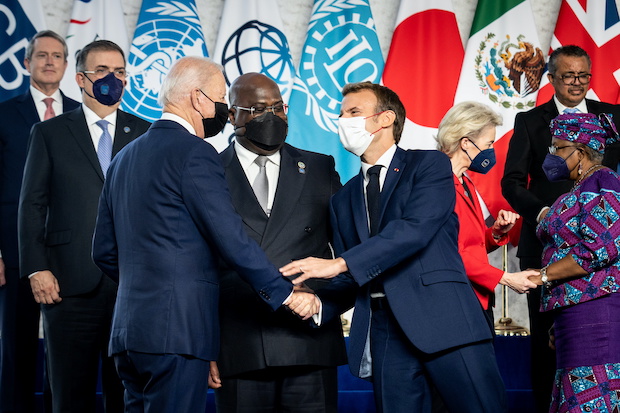
US President Joe Biden shakes hands with French President Emmanuel Macron as Democratic Republic of the Congo President Felix Tshisekedi looks on during a family photo session on the sidelines of the G20 summit at the La Nuvola in Rome, Italy Oct. 30, 2021. (Erin Schaff/Pool via REUTERS)
ROME — Leaders of the Group of 20 major economies agreed on a final statement on Sunday that urged “meaningful and effective” action to limit global warming but offered few concrete commitments and disappointed climate activists.
READ: Acclaim for Greta Thunberg as pre-COP protesters rally in Glasgow
The result of days of tough negotiation among diplomats leaves huge work to be done at a broader UN COP26 climate summit in Scotland, to where most of the G20 leaders will fly directly from Rome.
UN Secretary-General Antonio Guterres, who warned on Friday that the world was rushing headlong towards climate disaster, said the Rome summit neither fulfilled his hopes nor buried them.
“While I welcome the #G20’s recommitment to global solutions, I leave Rome with my hopes unfulfilled — but at least they are not buried,” he said in a tweet.
“Onwards to #COP26 in Glasgow to keep the goal of 1.5 degrees alive and to implement promises on finance and adaptation for people & planet.”
The 1.5ºC threshold is what UN experts say must be met to avoid a dramatic acceleration of extreme climate events like droughts, storms, and floods, and to reach it they recommend net-zero emissions should be achieved by 2050.
The stakes are huge – among them the very survival of low-lying countries, the impact on economic livelihoods the world over, and the stability of the global financial system.
“This was a moment for the G20 to act with the responsibility they have as the biggest emitters, yet we only see half-measures rather than concrete urgent action,” said Friederike Roder, vice president of sustainable development advocacy group Global Citizen.
The G20 bloc, which includes Brazil, China, India, Germany, and the United States, accounts for an estimated 80% of global greenhouse gas emissions.
The final document says current national plans on how to curb emissions will have to be strengthened “if necessary” and makes no specific reference to 2050 as a date to achieve net-zero carbon emissions.
“We recognize that the impacts of climate change at 1.5°C are much lower than at 2°C. Keeping 1.5°C within reach will require meaningful and effective actions and commitment by all countries,” the communique said.
Consequences of inaction
The leaders only recognized “the key relevance” of halting net emissions “by or around mid-century”, a phrase that removed the 2050 date seen in previous versions of the final statement so as to make the target less specific.
China, the world’s biggest CO2 emitter, has set a target date of 2060, and other large polluters such as India and Russia have also not committed to the 2050 target date.
UN experts say that even if current national plans are fully implemented, the world is headed for global warming of 2.7ºC, with catastrophic consequences.
The final G20 statement includes a pledge to halt financing of overseas coal-fired power generation by the end of this year, but set no date for phasing out coal power, promising only to do so “as soon as possible”.
This replaced a goal set in a previous draft of the final statement to achieve this by the end of the 2030s, showing how strong the push-back from some coal-dependent countries is.
The G20 also set no date for phasing out fossil fuel subsidies, saying they will aim to do so “over the medium term”.
On methane, which has a more potent but less lasting impact than carbon dioxide on global warming, they watered down their wording from a previous draft that pledged to “strive to reduce our collective methane emissions significantly”.
The final statement merely recognizes that reducing methane emissions is “one of the quickest, most feasible and most cost-effective ways to limit climate change”.
G20 sources said negotiations were tough over so-called “climate financing”, which refers to a 2009 pledge by rich nations to provide $100 billion per year by 2020 to help developing countries tackle climate change.
They have failed to meet the pledge, generating mistrust and a reluctance among some developing nations to accelerate their emissions reductions.
“We recall and reaffirm the commitment made by developed countries, to the goal of mobilizing jointly USD 100 billion per year by 2020 and annually through 2025 to address the needs of developing countries,” the G20 statement says.
The leaders “stress the importance of meeting that goal fully as soon as possible”.
Italy will triple its climate finance contribution to $1.4 billion per year for the next five years, Prime Minister Mario Draghi said. But the amount is considerably less than what some think tanks estimate the country’s fair contribution should be.
The United Nations said last week greenhouse gas concentrations hit a record in 2020 and the world is “way off track” in capping rising temperatures.
World leaders will kick start COP26 on Monday with two days of speeches that could include some new emissions-cutting pledges before technical negotiators lock horns over the rules of the 2015 Paris climate accord.